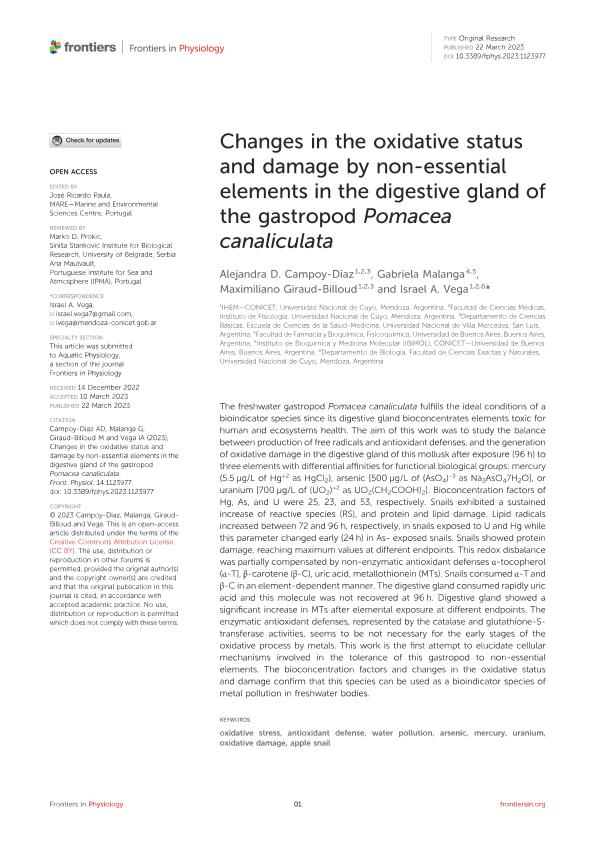Artículo
Changes in the oxidative status and damage by non-essential elements in the digestive gland of the gastropod Pomacea canaliculata
Campoy Díaz, Alejandra Daniela ; Malanga, Gabriela Fabiana
; Malanga, Gabriela Fabiana ; Giraud Billoud, Maximiliano German
; Giraud Billoud, Maximiliano German ; Vega, Israel Aníbal
; Vega, Israel Aníbal
 ; Malanga, Gabriela Fabiana
; Malanga, Gabriela Fabiana ; Giraud Billoud, Maximiliano German
; Giraud Billoud, Maximiliano German ; Vega, Israel Aníbal
; Vega, Israel Aníbal
Fecha de publicación:
03/2023
Editorial:
Frontiers Media
Revista:
Frontiers in Physiology
e-ISSN:
1664-042X
Idioma:
Inglés
Tipo de recurso:
Artículo publicado
Clasificación temática:
Resumen
The freshwater gastropod Pomacea canaliculata fulfills the ideal conditions of a bioindicator species since its digestive gland bioconcentrates elements toxic for human and ecosystems health. The aim of this work was to study the balance between production of free radicals and antioxidant defenses, and the generation of oxidative damage in the digestive gland of this mollusk after exposure (96 h) to three elements with differential affinities for functional biological groups: mercury (5.5 μg/L of Hg+2 as HgCl2), arsenic [500 μg/L of (AsO4)−3 as Na3AsO47H2O], or uranium [700 μg/L of (UO2)+2 as UO2(CH2COOH)2]. Bioconcentration factors of Hg, As, and U were 25, 23, and 53, respectively. Snails exhibited a sustained increase of reactive species (RS), and protein and lipid damage. Lipid radicals increased between 72 and 96 h, respectively, in snails exposed to U and Hg while this parameter changed early (24 h) in As- exposed snails. Snails showed protein damage, reaching maximum values at different endpoints. This redox disbalance was partially compensated by non-enzymatic antioxidant defenses α-tocopherol (α-T), β-carotene (β-C), uric acid, metallothionein (MTs). Snails consumed α-T and β-C in an element-dependent manner. The digestive gland consumed rapidly uric acid and this molecule was not recovered at 96 h. Digestive gland showed a significant increase in MTs after elemental exposure at different endpoints. The enzymatic antioxidant defenses, represented by the catalase and glutathione-S-transferase activities, seems to be not necessary for the early stages of the oxidative process by metals. This work is the first attempt to elucidate cellular mechanisms involved in the tolerance of this gastropod to non-essential elements. The bioconcentration factors and changes in the oxidative status and damage confirm that this species can be used as a bioindicator species of metal pollution in freshwater bodies.
Archivos asociados
Licencia
Identificadores
Colecciones
Articulos(IBIMOL)
Articulos de INSTITUTO DE BIOQUIMICA Y MEDICINA MOLECULAR
Articulos de INSTITUTO DE BIOQUIMICA Y MEDICINA MOLECULAR
Articulos(IHEM)
Articulos de INST. HISTOLOGIA Y EMBRIOLOGIA DE MEND DR.M.BURGOS
Articulos de INST. HISTOLOGIA Y EMBRIOLOGIA DE MEND DR.M.BURGOS
Citación
Campoy Díaz, Alejandra Daniela; Malanga, Gabriela Fabiana; Giraud Billoud, Maximiliano German; Vega, Israel Aníbal; Changes in the oxidative status and damage by non-essential elements in the digestive gland of the gastropod Pomacea canaliculata; Frontiers Media; Frontiers in Physiology; 14; 3-2023; 1-10
Compartir
Altmétricas



